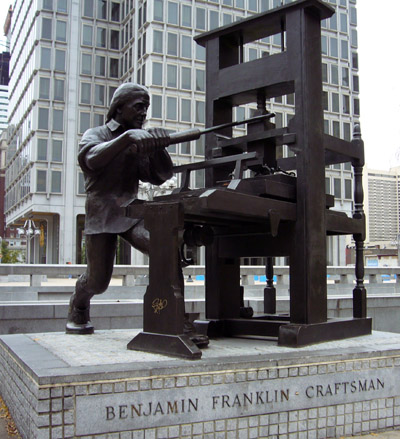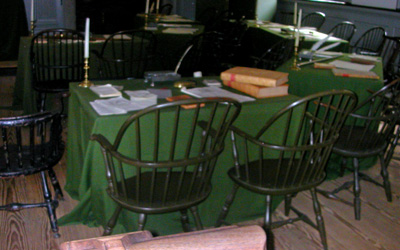Franklin celebration highlights contributions
PHILADELPHIA— Philadelphia celebrated the 300th birthday of one of America’s most famous Founding Fathers during 2006. Benjamin Franklin made many important and diverse contributions to the city in which he is truly a legend.
Although he was born in Boston on Jan. 17, 1706, Franklin ran away to Philadelphia at the age of 17 and became a prominent author, publisher, civil activist, inventor, scientist, philosopher, politician and diplomat.
“America would be a very different country without Ben Franklin. He helped shape our country and then helped to better the lives of the American people,” said Don Stanko, a park ranger at Independence National Historical Park.
 |
A sculpture of Benjamin Franklin during his career as a colonial printer is across the street from Philadelphia City Hall (Staff photo). |
Franklin was introduced to the trade of printing at a young age. At only 12, he became an apprentice to his older brother James, a printer.
“He ran away from home and left his apprenticeship without anyone’s permission, which made him a criminal,” said Tim Oswald, a park ranger who often demonstrates the 18th Century printing press located in Franklin Court.
Although he was trained in Boston, Franklin made his fortune printing in Philadelphia. He published the Philadelphia Gazette while also printing colonial money and lottery tickets.
In 1733, Franklin began to issue the famous Poor Richard’s Almanac and then Father Abraham’s Sermon, which is one of the most notable pieces of literature produced in colonial America.
“Franklin made the newspaper and periodicals he wrote and published popular because he preached common sense with an unparalleled wit. He was a unique man with extraordinary ideas,” Oswald said.
He regarded printing as his greatest achievements, but Franklin contributed much more to Philadelphia. A proper and energetic son of the Enlightenment, he improved safety, education and healthcare in the city.
In 1731, Franklin helped to establish the Library Company, America’s first lending library, to provide books to people who would normally have very little access to them. The company, which had been operating out of Carpenters’ Hall, became so popular that, in 1789, they constructed Library Hall.
Franklin also introduced octagon-shaped watch boxes for the Philadelphia night watch. Reproductions of the red watch boxes can be seen around Independence Square.
Robert Bankson, a park ranger at Independence National Historical Park, explains the significance of Franklin’s invention to passing visitors.
“He thought that they should be octagon because if anyone were to push the box over, the person inside should simply roll around until he could open the door. It really was a great idea,” Bankson said.
Franklin’s many inventions and his willingness to share those inventions improved life in Philadelphia on several levels.
“Ben Franklin never patented any of his inventions because he wanted as any people to benefit as possible. He was more concerned with helping the people of Philadelphia than making money,” Bankson said.
He established the American Philosophical Society in 1743 for the “promotion and sharing of useful knowledge” and in 1750 Franklin successfully carried out his notable electricity experiment with a kite in Philadelphia.
As well as success in writing, printing, public service and science, Franklin also was also an important politician and a Founding Father of the nation.
In a unanimous vote, the Pennsylvania Assembly elected Franklin as their delegate in the Second Continental Congress.
| Benjamin Franklin sat at this table during sessions at Philadelphia’s Independence Hall (Photo by Niccole Burns). |  |
Tony Brown, a park ranger that often gives tours of Independence Hall, always explains Franklin’s importance in the former State House of Philadelphia.
“Ben Franklin was the second oldest man at the Continental Congress, but he wasn’t too old to make important decisions in the way the United States of America would be ran,” Brown said.
In 1776, Franklin drafted the Declaration of Independence with John Adams, Thomas Jefferson, Robert Livingston and Roger Sherman. He also made several changes to Jefferson’s first draft.
The United States Constitution was completed in Philadelphia in1787. When presenting it for ratification, Franklin gave a speech in which he stated that he was not completely satisfied, but they would never execute a perfect document.
Although the Founding Fathers are highly regarded to today for the birth of the country, they were considered criminals committing treason at the time. Franklin’s involvement in the American Revolution had a very personal effect on him.
“Like other wars, the Revolutionary War had supporters and opponents, and sometimes there are both in the same family. Ben Franklin’s family was one of the many families that broke up because of the Revolutionary War,” Brown said.
Despite the effects on his personal life, Franklin dedicated his life to the advancement of life in America. When he died in April 1790 at the age of 84, about 20,000 people attended his funeral.
He is buried in Christ Church Burial Ground in Philadelphia next to his wife, Deborah.

Comments are Closed